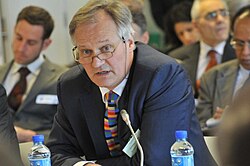Total Pageviews
Wednesday, 29 May 2013
Coral that foundered on the reef of corruption
Reuters reported yesterday that two top executives of a British investment fund in Cuba are to go on trial in Havana on Thursday 30 May.
The trial is part of a government crackdown on corruption involving foreign businessmen and is the second trial of foreign executives in a week.
Amado Fakhre, a Lebanese-born British citizen and chief executive officer of Coral Capital Group Ltd, faces various bribery charges related to the fund's import business. His Chief Operating Officer Stephen Purvis, who headed up various investment projects, faces lesser charges, such as operating outside the bounds of the fund's license.
Fakhre, whose Havana office HQ is pictured above, has been jailed since the company's offices were raided and closed in October 2011. Purvis was arrested and imprisoned in March 2012.
Coral Capital was one of only a handful of small foreign investment funds in Cuba.
Inanother case, in September 2011 the authorities shut down Canada-based Tokmakjian Group, after doing the same in July to another Canadian trading firm, Tri-Star Caribbean.
The closed trial of Sarkis Yacoubian, originally from Armenia and the owner of Tri-Star Caribbean, was held last week. An associate of Yacoubian, Lebanese citizen Krikor Bayassalian, was a co-defendant.
They were charged with bribery, tax evasion and damaging the economy.
Dozens of Cuban officials and businessmen have reportedly been arrested, tried and sentenced in the anti-corruption sweep.
A number of other foreigners and Cubans who worked for the three foreign companies remain free but cannot leave the island because they are considered witnesses.
Coral Capital, registered in the British Virgin Islands in 1999, was best known in Cuba as the joint venture partner in Havana's Saratoga Hotel and another hotel complex on the resort key of Cayo Coco. It had plans to build golf courses and related real estate developments near Havana, for which it had begun raising equity capital.
The fund diversified into trade financing and importing heavy equipment and other merchandise .
The company represented various international brands in Cuba, among them Liebherr Earth Moving, Yamaha Motor Corporation and Peugeot Motorcycles.
Coral Capital had invested some $75 million in Cuba, with more than $1 billion of projects in the works.
Friday, 17 May 2013
European Union warms to Havana
The European Union (EU) may begin negotiations with Cuba by the end of this year, according to Christian Leffler, the EU Americas Department Executive Director, (pictured) at a news conference on 9 May during a visit to Havana.
This is good news and long overdue. Cuba is the only country in Latin America and the Caribbean with which the EU does not have an cooperation agreement. “This is an exception that should not continue,” said Mr Leffler.
Earlier in the week he said that “there is much to do” but “what is most important is that we are talking and listening, that we talk with Cuba and not about Cuba”. The goal of his visit, he added, was “to celebrate what unites us and to discuss what separates us. The past cannot be changed, but we have the power to shape our future. There is political will for that”.
EU policy towards Havana is governed by the so-called “Common Position”, which was approved in 1996 and is rejected by Cuba. EU Foreign Ministers agreed in November 2012 to explore crafting a bilateral accord with Havana that would go beyond the “Common Position” and called on the EU’s top diplomat Catherine Ashton to prepare a plan to negotiate a cooperation agreement with Cuba. “Starting now, what the (European) Commission is going to do is to establish some guidelines so that this cooperation accord may be negotiated, representing a step forward in the relationship between the European Union and Cuba,” Spain’s Deputy Foreign Minister, Gonzalo de Benito, said at the time.
A draft negotiating mandate to take forward formal discussions with Cuba still has to be agreed by EU member states. Any agreement is thought likely to include – as do all such EU association or partnership agreements – language on development support, political and economic relations and trade.
Subscribe to:
Comments (Atom)
